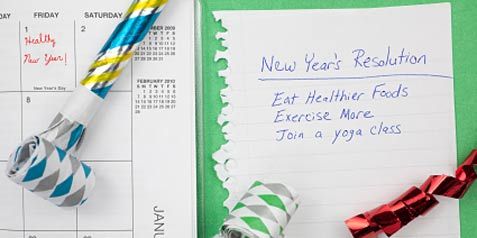
Did you know 40-45% of adults in the U.S. will make New Year’s resolutions this year? Usually resolutions involve some type of self-improvement or a change in health behaviors, like losing weight, exercising more, quitting smoking and reducing alcohol use.
Did you know out of those who make resolutions, only 40-46% keep them? It’s time to take advantage of the New Year and make plans for change!
Many researchers have looked at what makes a person successful in making behavior changes. Here’s what separates the successful resolution makers from the flops:
- Set realistic, attainable and specific goals. Examples: “I will walk at the mall 4 times per week.” “I will drink milk with breakfast, lunch and dinner 5 days a week.” These goals say exactly what you will do and how often. You have to ask yourself with each goal you set if it’s realistic and if you think you can really do it.
- Specifically, what are you going to do to counter problems you may face? For example, if you love to walk outside but you don’t like the cold and ice, you probably aren’t going to do it. But if walking is what you want to do for exercise, make a plan to walk indoors at a mall. Specific plan: “I will go to the mall and walk 30 minutes at lunchtime 4 days a week.”
- Have a conversation with yourself to reinforce that you have confidence to keep your resolutions, despite an occasional slip. Self-belief is the strongest predictor of who succeeds.
- Tell people your resolutions. Find others who are working on making change, gain support and have fun with it! You could even work out together or cook healthier meals once a week together.
Here are a few more steps to take that are critical for success:
- Track your progress – record, self-monitor; know where you’ve been, where you are, and where you’re going. Weigh yourself; keep food and activity records, record progress on all goals daily. Re-evaluate your goals weekly and adjust as necessary.
- Build a healthy behavior incompatible with what you resolve to change. For example, if you want to change your habit of eating in front of the TV, take up a hobby that keeps your hands busy.
- Create a helpful environment – limit your exposure to high risk situations. If you are avoiding alcohol, don’t hang out at a bar.
- Expect occasional slips. It’s ok! It’s human and going to happen, so have a plan. Pick yourself right back up and keep going. Look at the situation and what brought about the slip so you’re aware next time.
- At the same time, don’t get down on yourself for a slip. Avoid looking at the negatives and focus on your positive successes. Watch the self-talk – be gentle and encouraging to yourself. Frequent self-blamers tend to give up.
- Reward your successes – a movie, a healthy treat, time alone, time with a friend, a hot bath, a good book. Positive reinforcement and acknowledgement of your efforts is important.
Remember human behavior change takes time; a quick decision doesn’t become a permanent behavior overnight. You can be assured that if you put these at least half of these practices into play, you will be on track for your resolutions becoming your new permanent behavior.
Janice Cox, RDN, LD, Lunds and Byerly’s Registered Dietitian/Nutritionist





